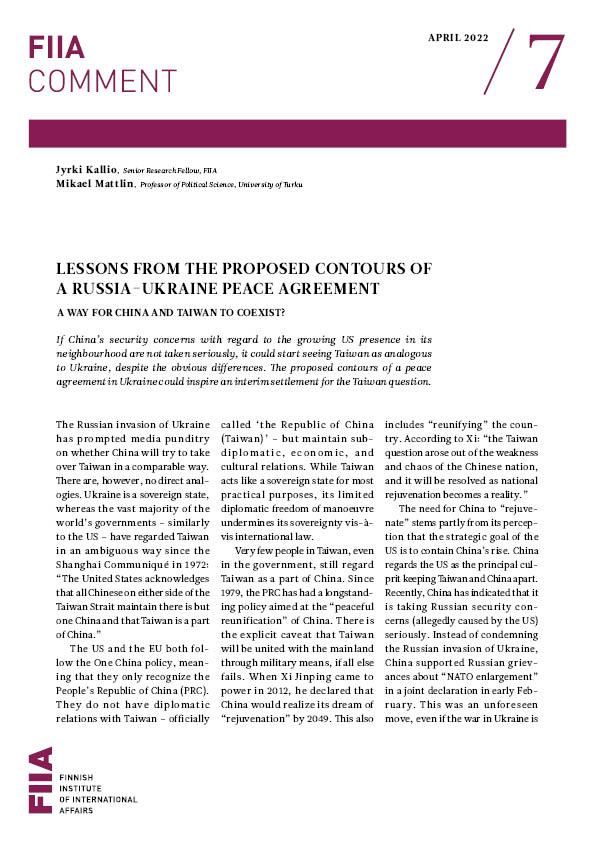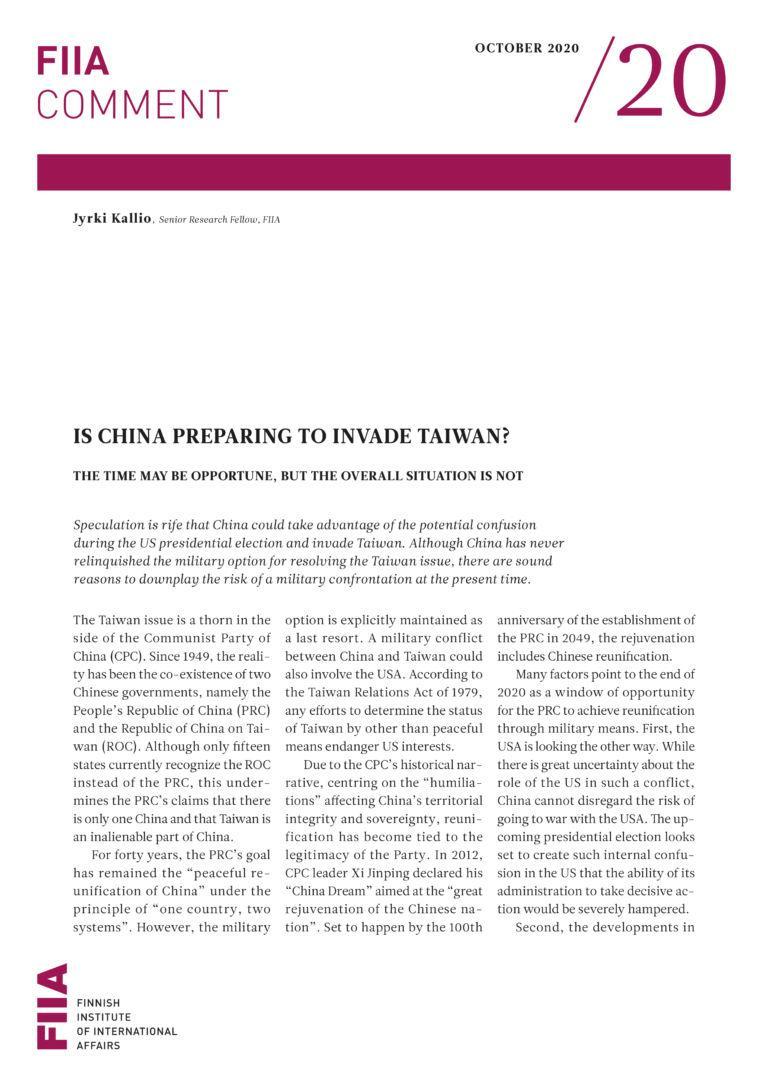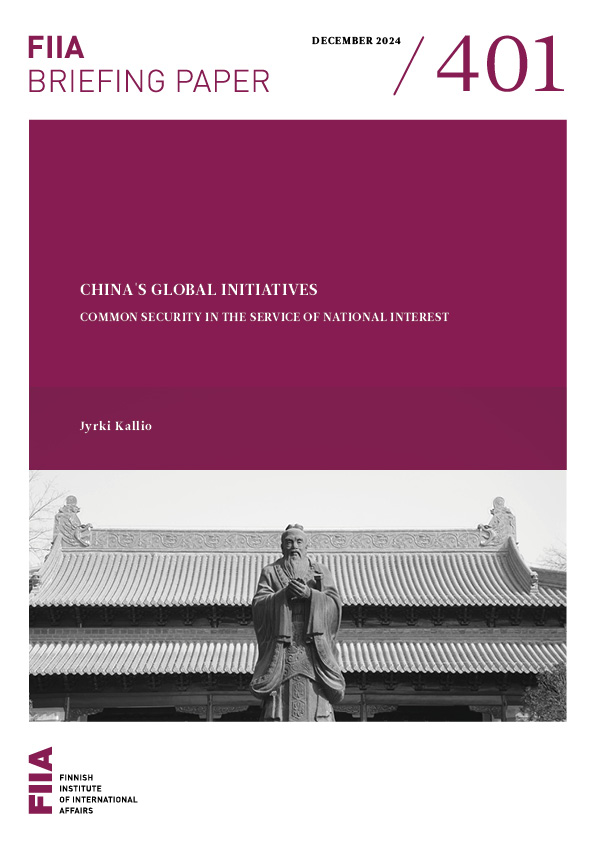If China’s security concerns with regard to the growing US presence in its neighbourhood are not taken seriously, it could start seeing Taiwan as analogous to Ukraine, despite the obvious differences. The proposed contours of a peace agreement in Ukraine could inspire an interim settlement for the Taiwan question.
The Russian invasion of Ukraine has prompted media punditry on whether China will try to take over Taiwan in a comparable way. There are, however, no direct analogies. Ukraine is a sovereign state, whereas the vast majority of the world’s governments – similarly to the US – have regarded Taiwan in an ambiguous way since the Shanghai Communiqué in 1972: “The United States acknowledges that all Chinese on either side of the Taiwan Strait maintain there is but one China and that Taiwan is a part of China.” The US and the EU both follow the One China policy, meaning that they only recognize the People’s Republic of China (PRC). They do not have diplomatic relations with Taiwan – officially called ‘the Republic of China (Taiwan)’ – but maintain sub-diplomatic, economic, and cultural relations. While Taiwan acts like a sovereign state for most practical purposes, its limited diplomatic freedom of manoeuvre undermines its sovereignty vis-à-vis international law.
Very few people in Taiwan, even in the government, still regard Taiwan as a part of China. Since 1979, the PRC has had a longstanding policy aimed at the “peaceful reunification” of China. There is the explicit caveat that Taiwan will be united with the mainland through military means, if all else fails. When Xi Jinping came to power in 2012, he declared that China would realize its dream of “rejuvenation” by 2049. This also includes “reunifying” the country. According to Xi: “the Taiwan question arose out of the weakness and chaos of the Chinese nation, and it will be resolved as national rejuvenation becomes a reality.”
The need for China to “rejuvenate” stems partly from its perception that the strategic goal of the US is to contain China’s rise. China regards the US as the principal culprit keeping Taiwan and China apart. Recently, China has indicated that it is taking Russian security concerns (allegedly caused by the US) seriously. Instead of condemning the Russian invasion of Ukraine, China supported Russian grievances about “NATO enlargement” in a joint declaration in early February. This was an unforeseen move, even if the war in Ukraine is arguably not in China’s interests. It is disrupting the global economy at a time when the Chinese economy is already fragile. It also sets a dangerous precedent of slicing up sovereign nations through externally supported separatism, something that China has always been concerned about with regard to Tibet and Xinjiang. Nevertheless, the risk that China may be starting to see Ukraine through the Taiwan lens cannot be completely ruled out.
The premises that need to be addressed when looking for a solution to the Taiwan question are as follows: Unification of China under the ‘One China, Two Systems’ formula is not possible because of the almost unequivocal opposition of the Taiwanese. Equally unfeasible are federalist or confederalist solutions. It is worth remembering that while the US and the EU abide by the One China policy, they also maintain that the fate of Taiwan should not be decided over the heads of the Taiwanese people.
Furthermore, while China has a mental deadline for “reunification”, execution of the military option is not imminent unless there are drastic changes to the status quo threatening to thwart China’s dream, such as Taiwan moving towards formal independence.
Lastly, China’s security concerns regarding the US are tightly intertwined with Taiwan. If the US relinquishes its One China policy – as President Trump threatened to do – and sets up military bases in Taiwan, China may interpret this as an act that justifies military action.
The Ukraine war has shown how difficult it is to subdue a determined nation fighting for its survival with ample external support. It is therefore possible that China could make a virtue out of necessity and show flexibility on “reunification”. The proposed contours of a Ukraine peace agreement, reportedly discussed in mid-March, offer an interesting model for maintaining peace in the Taiwan Strait, reminiscent of the “interim solutions” proposed by academics at one time or another. These contours include Ukraine formally relinquishing its aspiration to join NATO, while still seeking external security guarantees, as well as postponing a discussion on difficult issues, such as the status of the separatist regions. In the case of Taiwan, the solution essentially lies in recognizing China’s security concerns, while simultaneously giving external security guarantees to Taiwan.
The model that we propose includes the following three elements.
First, Taiwan should refrain from seeking formal independence. In return, China should commit to a policy of non-aggression. This would be a form of mutual deterrence. Either side breaking this pact would immediately void it.
Second, Taiwan should commit to military non-alliance, but in return receive security guarantees from the US, possibly together with other regional powers.
Third, the decision on the future status of Taiwan should be postponed by 15 to 30 years. It is impossible for the Communist Party to entirely relinquish the goal of “reunification” before a generational change takes place in its leadership.
If China-US relations were to improve, allowing China to feel more confident and magnanimous, it could pave the way for Taiwan’s participation in international organizations such as the World Health Organization and the International Civil Aviation Organization. In return, Taiwan could consider vowing not to buy offensive weaponry from the United States, as US arms sales to Taiwan have consistently been one of China’s main concerns since the 1970s.
The model that we propose is, admittedly, not optimal for either side. But in a world already trapped in a detrimental spiral of security, climate, and economic troubles, a suboptimal solution may be preferrable to even worse options.






